The Kansas City Chiefs, a name synonymous with modern NFL dominance, are perpetually in the spotlight. From the dazzling plays of quarterback Patrick Mahomes to the headline-grabbing opinions of kicker Harrison Butker, and the celebrity buzz surrounding Taylor Swift’s presence, the Chiefs, owned by the Hunt Family, are rarely out of the news cycle. Their consistent Super Bowl appearances, marking their fifth in just seven seasons, solidify their place as a premier franchise. But the story behind the team’s ownership is as compelling as their on-field triumphs. This is the saga of the Hunt family, a dynasty built on oil wealth that has expanded its empire into sports and beyond.
The Chiefs’ story began with Lamar Hunt Sr., who established the team as the Dallas Texans in 1959 before relocating them to Kansas City in 1963. Today, ownership is distributed among his children: Clark Hunt, Sharron Hunt Munson, Daniel Hunt, and Lamar Hunt Jr., with Clark Hunt leading as CEO since 2010 and spearheading major decisions. As the Chiefs geared up for another Super Bowl appearance, Clark Hunt reflected on his father’s vision, telling “The Rich Eisen Show” that Lamar, who passed away in 2006, “would be absolutely thrilled” at the prospect of a Chiefs three-peat. However, the Hunt family’s influence extends far beyond football fields; their narrative is deeply rooted in the legacy of H.L. Hunt, an American oil magnate whose entrepreneurial spirit laid the foundation for their vast fortune.
Haroldson Lafayette Hunt Made His Fortune in the Oil Industry
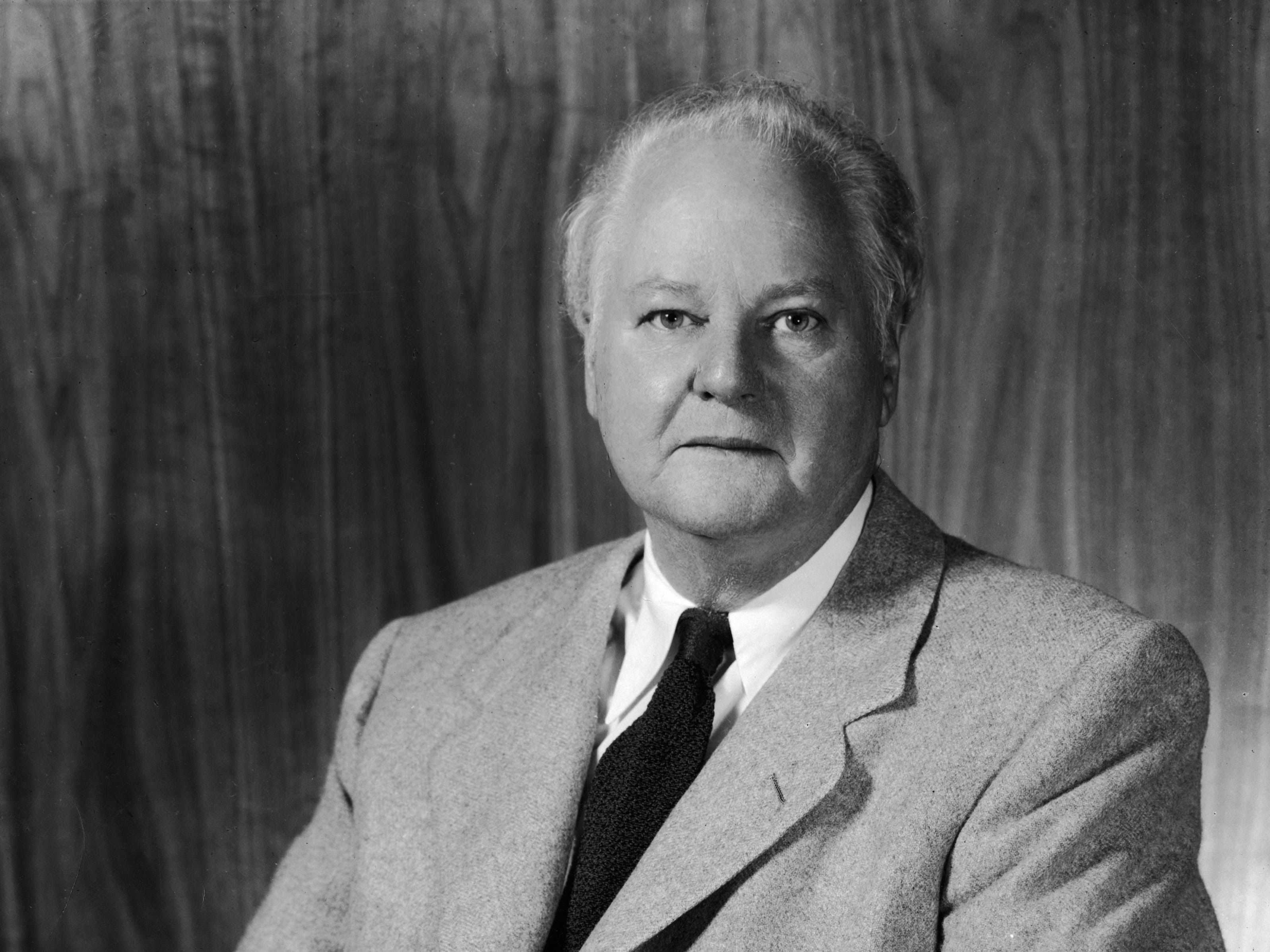 Haroldson Lafayette Hunt, the founder of Hunt Oil Company, in a portrait from the 1940s.
Haroldson Lafayette Hunt, the founder of Hunt Oil Company, in a portrait from the 1940s.
H.L. Hunt, the patriarch of the Hunt family, established Hunt Oil Company in 1936, building the foundation of their vast wealth. Image: Pictorial Parade/Staff/Getty Images via BI
Haroldson Lafayette “H.L.” Hunt, the progenitor of the Hunt family empire, was a legendary figure in the oil industry. In 1936, he founded the Hunt Oil Company, a venture that would become the cornerstone of an immense family fortune. By 1964, just under three decades after its inception, The New York Times reported the Hunt family’s wealth to be around $700 million – an astounding figure equivalent to approximately $7 billion in today’s economy. Hunt Oil Company was a prolific producer of oil and natural gas, with operations spanning across twelve states, including the oil-rich territories of Texas, Louisiana, and North Dakota. H.L. Hunt’s shrewd business acumen and relentless drive transformed a modest loan into a sprawling oil empire, setting the stage for generations of Hunt family prosperity.
Diversification and Expansion Beyond Oil
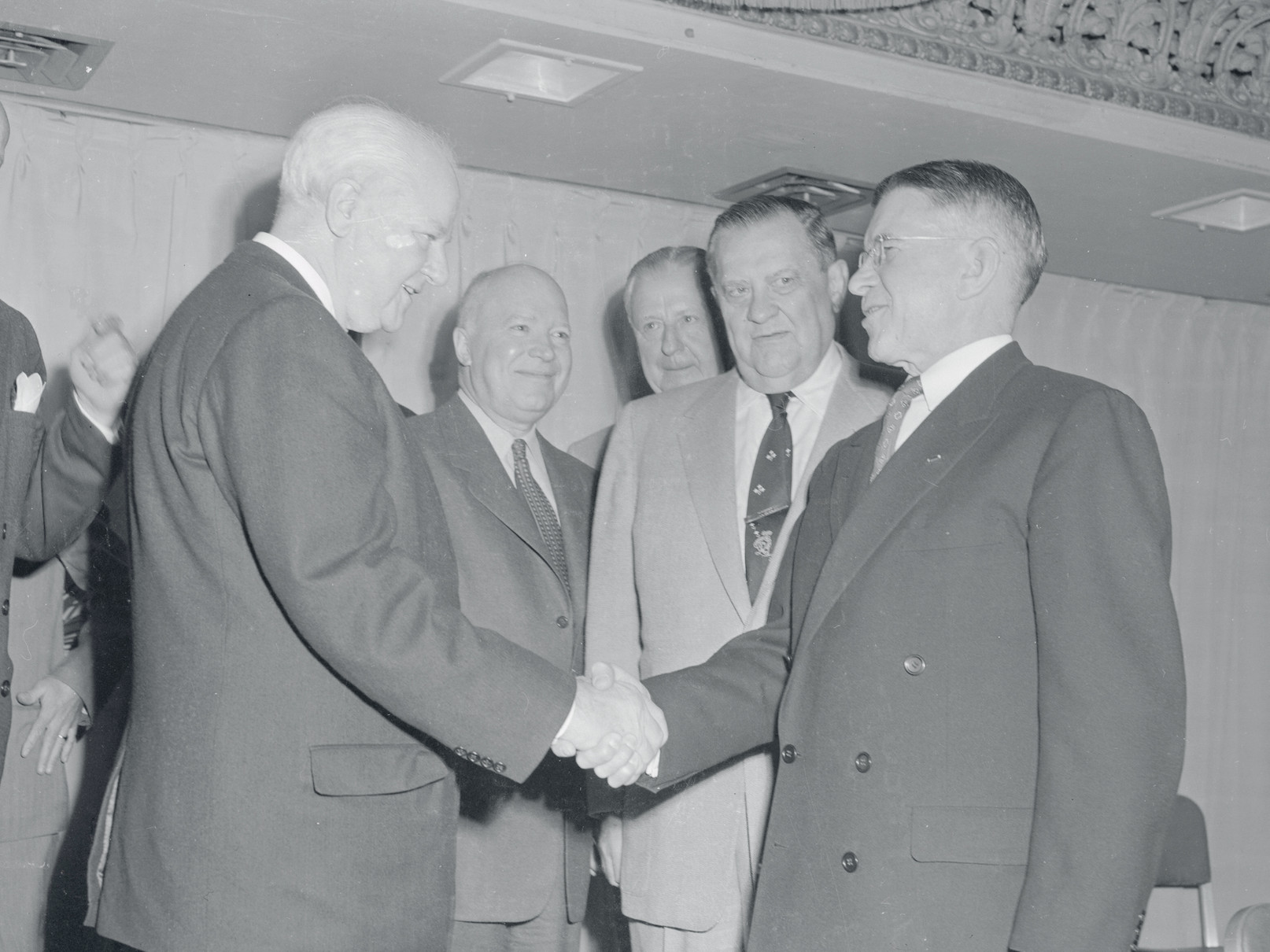 H.L. Hunt, pictured on the left shaking hands with Douglas McKay, then Secretary of the Interior, at the American Petroleum Institute's 34th annual meeting, highlighting his influence beyond oil.
H.L. Hunt, pictured on the left shaking hands with Douglas McKay, then Secretary of the Interior, at the American Petroleum Institute's 34th annual meeting, highlighting his influence beyond oil.
H.L. Hunt strategically diversified his investments, venturing into publishing, cosmetics, and even pecan farming, showcasing his diverse business interests. Image: Bettmann/Contributor/Getty Images via BI
H.L. Hunt was not content with confining his vast wealth solely to the oil industry. Demonstrating a keen eye for diversification, the Hunt family patriarch strategically reinvested profits into a diverse range of sectors. These ventures included forays into publishing, with the establishment of Facts Forum News, a foundation that produced conservative, anti-Communist radio and television programs from 1951 to 1963. His interests also spanned cosmetics and even the less conventional domain of pecan farming. This diversification strategy highlighted H.L. Hunt’s understanding of wealth preservation and growth beyond the volatile oil market, ensuring the family’s financial stability across various economic landscapes.
Legacy of Wealth and a Large Family
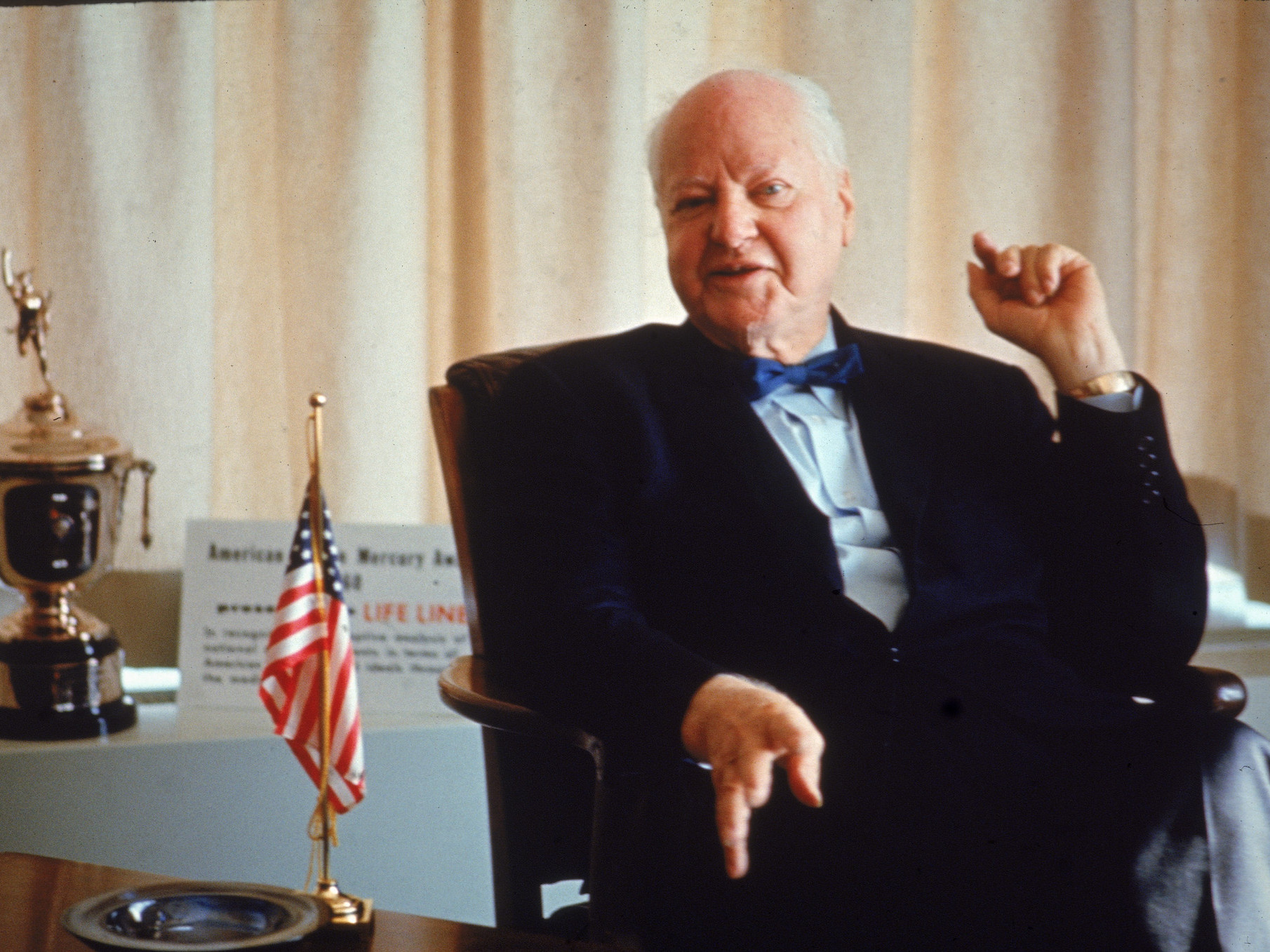 H.L. Hunt pictured at his desk in 1968, embodying the culmination of his life's work and the vast empire he built for the Hunt family.
H.L. Hunt pictured at his desk in 1968, embodying the culmination of his life's work and the vast empire he built for the Hunt family.
H.L. Hunt’s death in 1974 marked the transfer of his estimated $2-3 billion fortune to trusts for his 15 children, ensuring the continuation of the Hunt family legacy. Image: Shel Hershorn – HA/Inactive/Contributor/Getty Images via BI
When H.L. Hunt passed away in 1974 at the age of 85, his estimated net worth was an impressive $2 billion to $3 billion. His expansive fortune was meticulously structured into trusts, designed to benefit each of his 15 children, born from three different relationships. This careful estate planning ensured the long-term financial security of each branch of the Hunt family and facilitated the continuation of his business empire through subsequent generations. The dispersal of his wealth across a large family laid the groundwork for diverse paths and ventures pursued by his descendants, each contributing to the multifaceted Hunt family legacy.
The Children’s Generation: Ray Lee Hunt and Oil
 Ray Lee Hunt, chairman emeritus of Hunt Consolidated, Inc., pictured at the Middle East Petroleum and Gas Conference in Kuwait City in 2010, continuing the Hunt family's legacy in the oil and energy sector.
Ray Lee Hunt, chairman emeritus of Hunt Consolidated, Inc., pictured at the Middle East Petroleum and Gas Conference in Kuwait City in 2010, continuing the Hunt family's legacy in the oil and energy sector.
Ray Lee Hunt, the wealthiest of H.L. Hunt’s children, continues to lead Hunt Consolidated, Inc., maintaining the family’s significant presence in the energy sector. Image: YASSER AL-ZAYYAT/Stringer/AFP via Getty Images via BI
Among H.L. Hunt’s numerous offspring, Ray Lee Hunt has emerged as the wealthiest, exemplifying the enduring Hunt family presence in the oil and energy sectors. Forbes estimated his net worth at $6.9 billion as of February 2025. Ray Lee Hunt holds the position of chairman emeritus at Hunt Consolidated, Inc., a conglomerate that encompasses Hunt Oil Company, Hunt Energy, and Hunt Realty Investments. His leadership has been instrumental in maintaining and expanding the family’s core business in energy, while also diversifying into real estate and other ventures, further solidifying the Hunt family’s financial strength.
Caroline Rose Hunt and Rosewood Hotels
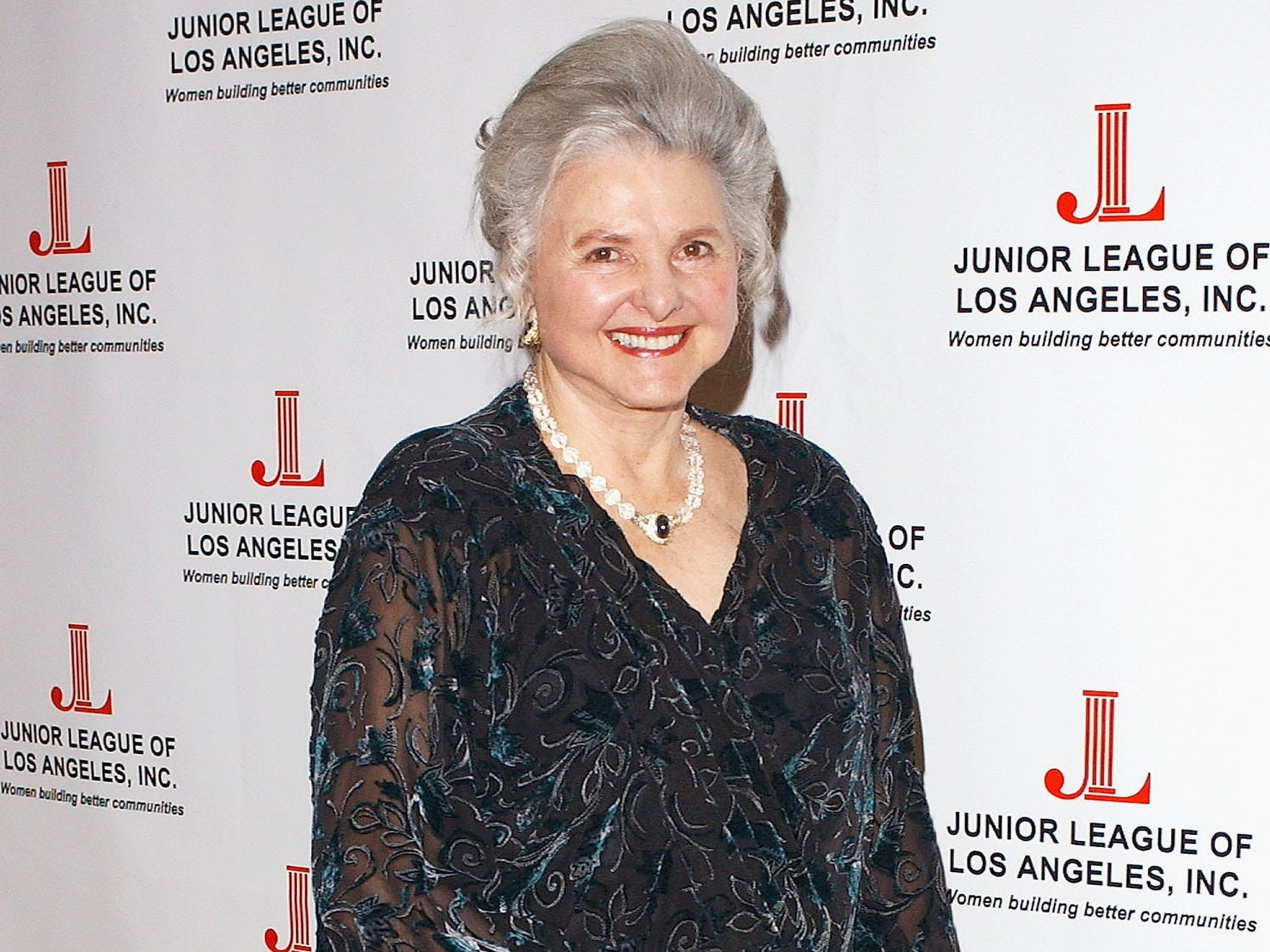 Caroline Rose Hunt, founder of Rosewood Hotels & Resorts, pictured at the Junior League of Los Angeles Carnivale Gala in 2004, showcasing her entrepreneurial success outside the oil industry.
Caroline Rose Hunt, founder of Rosewood Hotels & Resorts, pictured at the Junior League of Los Angeles Carnivale Gala in 2004, showcasing her entrepreneurial success outside the oil industry.
Caroline Rose Hunt expanded the Hunt family’s business interests into luxury hospitality with the creation of Rosewood Hotels & Resorts. Image: Amanda Edwards/Stringer/Getty Images via BI
Caroline Rose Hunt, Ray Lee’s sister, carved her own niche in the luxury hospitality industry, demonstrating the Hunt family’s entrepreneurial breadth. In 1979, she founded Rosewood Hotels & Resorts, inheriting The Rosewood Corporation from her father. Rosewood became synonymous with high-end luxury, establishing a global portfolio of prestigious hotels and resorts. In 2011, Rosewood Hotels & Resorts was sold to New World Hospitality (now Rosewood Hotel Group) for $229.5 million. Caroline Rose Hunt’s venture into hospitality showcased the diverse talents and business acumen within the Hunt family, extending their influence beyond their oil industry origins. She passed away in 2018 at the age of 95, leaving behind a significant legacy in the luxury hotel world.
William Herbert Hunt and Petro-Hunt
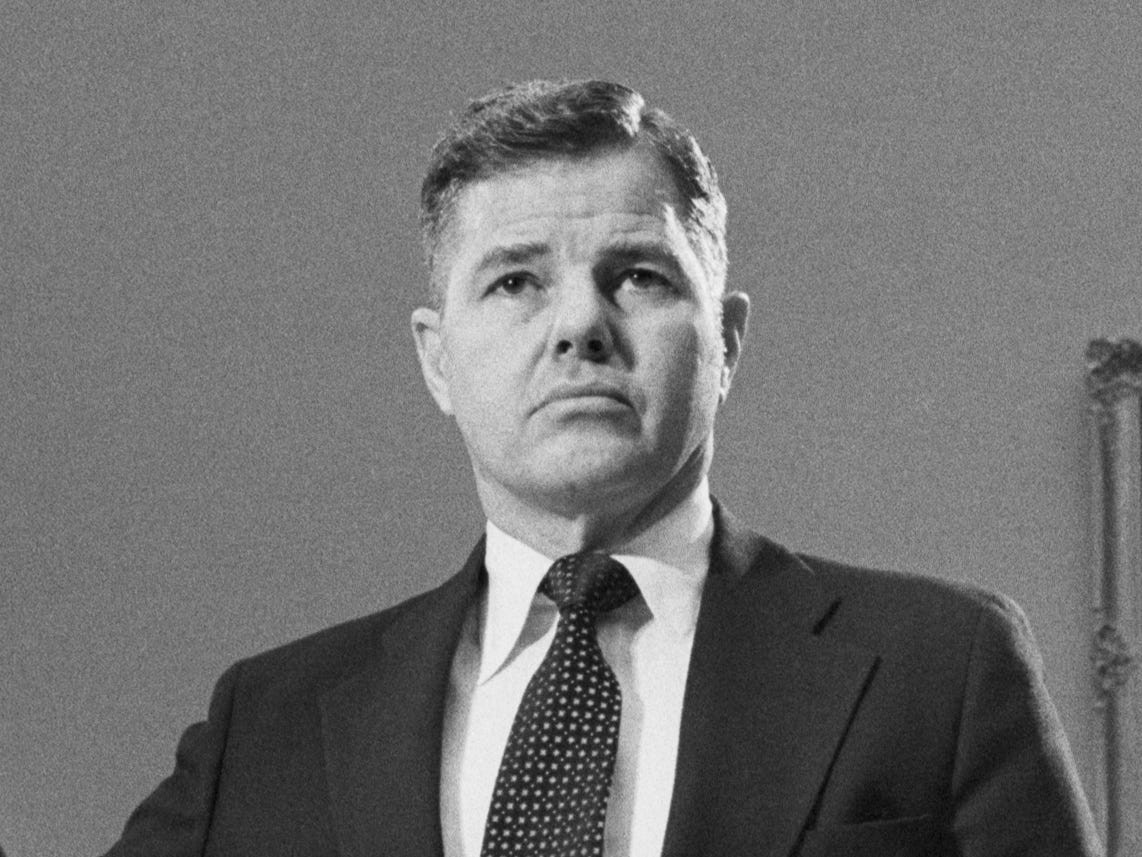 William Herbert Hunt, pictured with his brother, highlighting the Hunt brothers' continued involvement in the oil and gas industry through Petro-Hunt.
William Herbert Hunt, pictured with his brother, highlighting the Hunt brothers' continued involvement in the oil and gas industry through Petro-Hunt.
William Herbert Hunt’s family continues to operate Petro-Hunt, maintaining the Hunt family’s long-standing presence in the oil and gas sector. Image: Bettmann/Contributor/Getty Images via BI
William Herbert Hunt, another brother in the extensive Hunt family, played a key role in leading Petro-Hunt, the family’s oil and gas company. Before his passing in April 2024, he served as an advisor to management, ensuring the continuity of the family’s expertise in the energy sector. Petro-Hunt, as stated on its company website, remains owned and operated by the Hunt family, demonstrating their sustained commitment to the oil and gas industry. Beyond its core focus, Petro-Hunt also engages in mineral and royalty acquisitions, real estate investments, and holds a partial ownership stake in an oil refinery, illustrating the diversified approach to business that is characteristic of the Hunt family.
Lamar Hunt: Football and the Kansas City Chiefs
 Lamar Hunt watching a 1986 game between the Kansas City Chiefs and Pittsburgh Steelers, the visionary founder who brought the Hunt family into the world of professional football.
Lamar Hunt watching a 1986 game between the Kansas City Chiefs and Pittsburgh Steelers, the visionary founder who brought the Hunt family into the world of professional football.
Lamar Hunt, a pivotal figure in the Hunt family legacy, founded the Kansas City Chiefs and the American Football League, revolutionizing professional football. Image: George Gojkovich/Contributor/Getty Images via BI
Lamar Hunt, a name that resonates deeply within the world of professional sports, represents the Hunt family’s significant foray into football. In 1959, after being denied an NFL franchise, Lamar Hunt boldly co-founded the American Football League (AFL), a rival league that would eventually reshape the landscape of American football. The AFL and NFL officially merged in 1970, and in honor of Lamar’s contributions, the Lamar Hunt Trophy is now awarded to the AFC Championship winner annually. Furthermore, Lamar Hunt established the Kansas City Chiefs (initially the Dallas Texans), a team that remains under Hunt family ownership today. He is also credited with popularizing the term “Super Bowl,” solidifying his lasting impact on the sport.
The Next Generation of Chiefs Owners
 Chiefs CEO Clark Hunt accepting the Lamar Hunt Trophy after the 2024 AFC Championship, carrying on his father's legacy in leading the Kansas City Chiefs.
Chiefs CEO Clark Hunt accepting the Lamar Hunt Trophy after the 2024 AFC Championship, carrying on his father's legacy in leading the Kansas City Chiefs.
Lamar Hunt’s four children inherited ownership of the Kansas City Chiefs, continuing the Hunt family’s deep connection to the team and the NFL. Image: Rob Carr/Staff/Getty Images via BI
Following Lamar Hunt’s death in 2006, ownership of the Kansas City Chiefs transitioned to his four children and his wife, Norma Hunt. After Norma Hunt’s passing in 2023 at the age of 85, the team’s co-owners became Lamar’s children: Clark Hunt, Sharron Hunt Munson, Lamar Hunt Jr., and Daniel Hunt. This generational transition ensured the Hunt family’s continued stewardship of the Chiefs franchise, maintaining a legacy of ownership deeply intertwined with the team’s identity and success.
Clark Hunt: CEO and the Chiefs’ Dynasty
 Chiefs CEO Clark Hunt at Super Bowl LIX Opening Night, instrumental in building the Kansas City Chiefs into a modern NFL dynasty.
Chiefs CEO Clark Hunt at Super Bowl LIX Opening Night, instrumental in building the Kansas City Chiefs into a modern NFL dynasty.
Clark Hunt, as CEO of the Kansas City Chiefs since 2010, has overseen a period of remarkable success, transforming the team into a dominant force in the NFL. Image: Jonathan Bachman/Stringer/Getty Images via BI
Clark Hunt, 59, assumed the role of chairman and CEO of the Chiefs organization in 2010, marking a new era for the team. His leadership proved transformative. In 2013, he made the pivotal decision to hire Andy Reid as head coach, a move that would usher in an unprecedented period of success. Under Clark Hunt’s guidance and Reid’s coaching, the Chiefs have become an NFL dynasty, securing three Super Bowl victories in just five seasons. Clark Hunt acknowledged the contributions of key figures in this success in an interview with “The Rich Eisen Show,” stating that a Super Bowl three-peat would be a testament to “Andy Reid, Patrick Mahomes, his teammates for the work they put in.” His tenure as CEO has solidified the Hunt family’s position at the pinnacle of professional football ownership.
Beyond Football: FC Dallas and Hunt Midwest
 Jesus Ferreira of FC Dallas in a 2024 game against Sporting Kansas City, representing the Hunt family's broader sports and business interests beyond the NFL.
Jesus Ferreira of FC Dallas in a 2024 game against Sporting Kansas City, representing the Hunt family's broader sports and business interests beyond the NFL.
The Hunt family’s sports investments extend to Major League Soccer with FC Dallas, demonstrating their wide-ranging influence in the sports world. Image: Matthew Visinsky/Contributor/Icon Sportswire via Getty Images via BI
The Hunt family’s business portfolio extends beyond the Kansas City Chiefs. Clark Hunt also serves as chairman and CEO of FC Dallas, a Major League Soccer (MLS) team, while his brother, Daniel Hunt, is the club’s president. Lamar Hunt’s involvement in soccer predates MLS; he founded the Dallas Tornado and the North American Soccer League in 1967 and was a charter investor in MLS when it launched in 1996. His commitment to soccer led to funding the first soccer-specific stadium in the US, Columbus Crew Stadium, in 1999. That same year, he received the National Soccer Hall of Fame Medal of Honor, and the US Open Cup Tournament was renamed in his honor. The family acquired the Dallas Burn MLS club in 2003, rebranding it as FC Dallas in 2005.
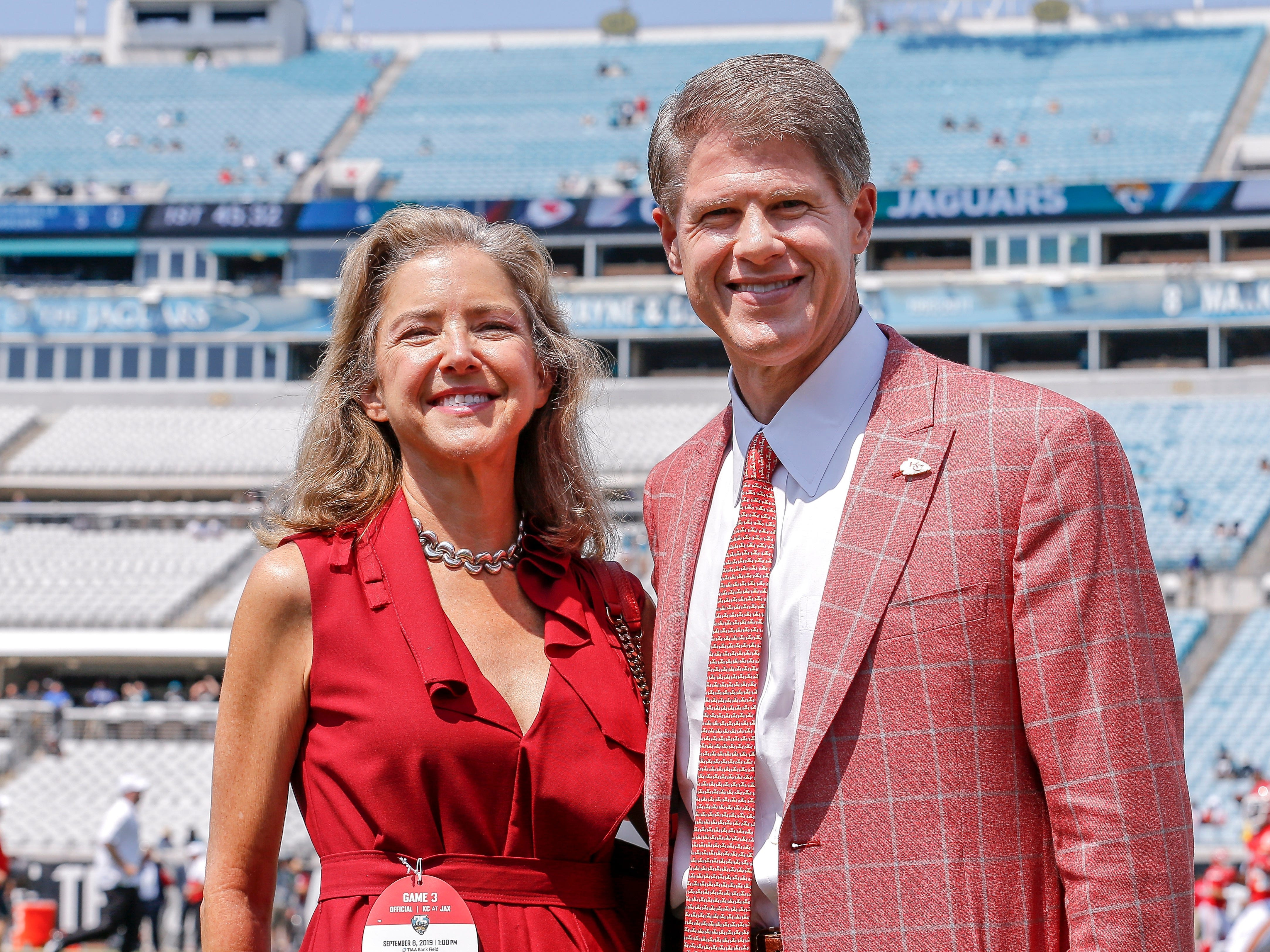 Lamar Hunt, the founder of Hunt Midwest, pictured showcasing the Hunt family's diverse business ventures beyond sports and energy.
Lamar Hunt, the founder of Hunt Midwest, pictured showcasing the Hunt family's diverse business ventures beyond sports and energy.
The Hunt family’s business empire includes Hunt Midwest, a significant real estate development company based in Kansas City. Image: Don Juan Moore/Contributor/Getty Images via BI
Additionally, the Hunt family possesses a substantial real estate portfolio under Hunt Midwest, based in Kansas City. According to the company website, Hunt Midwest is a “privately held real estate development company” with over $2.5 billion in developed projects. Their diverse real estate ventures include senior living communities, residential, multifamily, and industry-focused locations like SubTropolis, an underground business complex. Hunt Midwest exemplifies the Hunt family’s diversified business interests and their significant economic impact in the Kansas City region and beyond.
The Family Today: Tavia and Gracie Hunt
 Clark Hunt and his wife, Tavia Shackles Hunt, pictured before a January 2025 game between the Kansas City Chiefs and Denver Broncos, highlighting the family's prominent public presence.
Clark Hunt and his wife, Tavia Shackles Hunt, pictured before a January 2025 game between the Kansas City Chiefs and Denver Broncos, highlighting the family's prominent public presence.
Clark Hunt and Tavia Shackles Hunt represent the modern face of the Hunt family, actively involved in the Kansas City Chiefs organization and community. Image: Justin Edmonds/Contributor/Getty Images via BI
Clark Hunt’s wife, Tavia Shackles Hunt, is a prominent figure in the Hunt family and the Kansas City community. Married to Clark in 1993, Tavia, originally from Kansas City, has a background in beauty pageants, having been Miss Missouri Teen USA, Miss Kansas USA, and a second runner-up at Miss USA. She has also served as director of the Chiefs Women’s Organization, actively engaging with the community and the extended “football family.” Tavia and Clark have three daughters: Gracie, Ava, and Knobel, who are also becoming increasingly visible in the public eye.
 Gracie Hunt on the sidelines before a Kansas City Chiefs playoff game, embodying the younger generation of the Hunt family's involvement with the team.
Gracie Hunt on the sidelines before a Kansas City Chiefs playoff game, embodying the younger generation of the Hunt family's involvement with the team.
Gracie Hunt, daughter of Clark and Tavia Hunt, was Miss Kansas USA in 2021 and now works in public relations for the Chiefs, further integrating the Hunt family with the team’s operations. Image: Gracie Hunt Aaron M. Sprecher/Contributor/Getty Images
Their daughter, Gracie Hunt, 25, has carved her own path while remaining closely connected to the family’s sports legacy. Crowned Miss Kansas USA in 2021, Gracie previously pursued soccer before injuries led her to pageantry. Currently, she works in public relations for the Chiefs and has launched personal projects, including a capsule collection with Wear by Erin Andrews. Gracie is also a philanthropist, founding Breaking Barriers Through Sports in 2016, an organization focused on promoting positive identity and healthy lifestyles through sports.
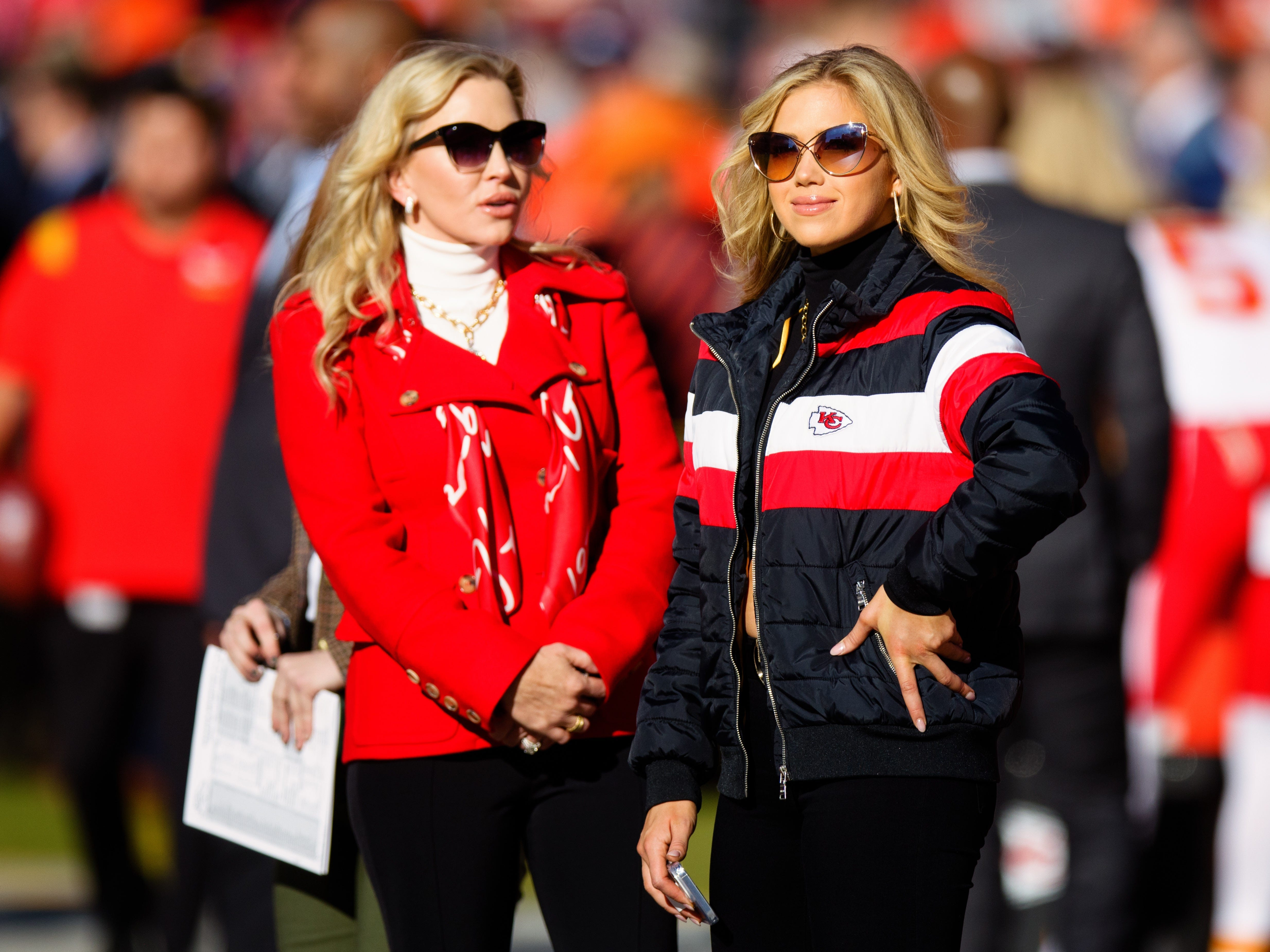 Tavia Shackles Hunt and Gracie Hunt at a Kansas City Chiefs game in 2022, demonstrating their shared involvement and influence within the Hunt family and the Chiefs organization.
Tavia Shackles Hunt and Gracie Hunt at a Kansas City Chiefs game in 2022, demonstrating their shared involvement and influence within the Hunt family and the Chiefs organization.
Tavia and Gracie Hunt have publicly addressed family values, including in response to Harrison Butker’s controversial speech, reflecting the Hunt family’s engagement with contemporary social issues. Image: Justin Edmonds/Contributor/Getty Images via BI
Recently, Tavia and Gracie Hunt gained attention for their public comments following Chiefs kicker Harrison Butker’s controversial commencement speech in May 2024. While Butker’s speech sparked backlash for its views on women’s roles, both Tavia and Gracie publicly expressed support for Butker’s right to his beliefs and affirmed the importance of family values. Tavia shared social media posts emphasizing the significance of motherhood and family, while Gracie, in a “Fox & Friends” interview, praised Butker’s faith and achievements while also acknowledging diverse paths for women. Their responses highlighted the Hunt family’s engagement with contemporary social and cultural discussions, while also underscoring their personal values.
The Hunt Family’s Enduring Impact
 Clark Hunt and family at Super Bowl LVIII in 2024, representing the continued success and unity of the Hunt family dynasty.
Clark Hunt and family at Super Bowl LVIII in 2024, representing the continued success and unity of the Hunt family dynasty.
The Hunt family’s combined net worth of $24.8 billion places them among the wealthiest families in the US, reflecting their enduring business success and influence. Image: Perry Knotts/Contributor/Getty Images via BI
Today, the Hunt family stands as one of the wealthiest and most influential families in the United States, with a combined net worth estimated by Forbes at $24.8 billion. Ranked as the 12th richest family in the US, they are positioned alongside other prominent dynasties like the Walton, Mars, and Cathy families. From H.L. Hunt’s oil fortune to Lamar Hunt’s transformative impact on professional sports and the diverse ventures of subsequent generations, the Hunt family’s story is one of enduring entrepreneurial success, strategic diversification, and a lasting legacy that extends across industries and generations.

